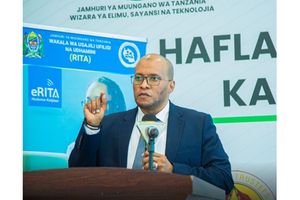
Permanent Secretary in the Ministry of Education, Science and Technology, Prof Carolyne Nombo, and HESLB acting executive director, Mr Elihuruma Lema, cut a ribbon to launch the 2025/26 academic year loan allocation guidelines. Students have been urged to read the guidelines carefully before applying once the window opens on June 15. PHOTO | COURTERSY
Dar es Salaam. In a major move to expand access to higher education, the government has allocated a record Sh916.7 billion in student loans for the 2025/26 academic year.
The funding is expected to benefit 252,773 students, including 88,320 first-year entrants and 164,453 continuing students across various universities and colleges nationwide.
This marks a sharp increase from the Sh787 billion allocated in 2024/25, underscoring the government’s continued investment in education and youth empowerment.
The announcement was made in Dodoma on June 6, 2025, during the official launch of the new higher education loan application guidelines.
Speaking at the event, the Permanent Secretary of the Ministry of Education, Science and Technology, Prof Carolyne Nombo, announced that the loan application window will be open from 15 June to 31 August 2025.
She urged students, parents, and guardians to read and understand the guidelines thoroughly before submitting applications, noting that technical errors have cost many applicants in previous years.
“These guidelines are essential for every student, parent, and guardian. We urge applicants to go through them carefully and follow the instructions exactly as provided,” said Prof Nombo.
“We’ve seen students fail to secure loans not because they lacked qualifications, but due to avoidable technical errors,” she added.
She advised applicants to log into their online accounts regularly to track their application status and make necessary corrections where applicable.
Prof Nombo noted that the entire loan application process will be fully digital and that applicants will not be required to submit hard copies of documents.
The upgraded system has been developed under the Higher Education for Economic Transformation (HEET) project.
Out of the total loan allocation, Sh64 billion has been set aside for 18,000 diploma-level students pursuing studies in priority sectors, including healthcare, education, mining, transport, energy, and agriculture.
“These sectors are critical to national development, and this targeted funding will help build a skilled workforce for Tanzania’s future,” she said.
The Higher Education Students’ Loans Board (HESLB) acting executive director, Mr Elihuruma Lema, said the new guidelines were developed following broad stakeholder consultations and approved by the Ministry and the HESLB Board of Directors.
“We aim to ensure the loan application process is transparent, fair, and inclusive,” said Mr Lema.
“We’ve worked to make the guidelines clear and easy to follow. We hope to see every eligible student access this support without unnecessary obstacles. This season is expected to be the best yet,” he added.
Mr Lema also announced that HESLB has integrated its systems with key national institutions, including the Registration, Insolvency, and Trusteeship Agency (Rita) and the National Examinations Council of Tanzania (Necta).
Other institutions are the Tanzania Social Action Fund (Tasaf), the National Identification Authority (Nida), the Tanzania Commission for Universities (TCU), and the Zanzibar Higher Education Loans Board (ZHESLB).
The integration aims to ensure rapid and accurate verification of applicant information, therefore reducing delays and enhancing accountability.
In addition to the loan scheme, the government will continue supporting high-achieving students through the Samia Scholarship, introduced in the 2022/23 academic year, targeting students with top performance in science subjects.
So far, 3,266 students have benefitted from the fund, which has disbursed Sh16.8 billion to date.
“This scholarship is a great opportunity for top-performing students. It is our way of recognising excellence and motivating others to aim higher,” Prof Nombo said.
Stakeholders in the education sector who attended the launch welcomed the government’s efforts to improve the student loan system.
The Tanzania Higher Learning Institutions Students’ Organisation (TAHLISO) Executive Secretary, Mr Godfrey Gulagu, praised the HESLB and pledged continued cooperation.
“As student organisations, we remain a bridge between the government and students. Our mission is to ensure that every qualified youth secures the opportunity to pursue higher education,” said Mr Gulagu.
Full loan application guidelines are available on the websites of the Ministry of Education (www.moe.go.tz) and the Higher Education Students’ Loans Board (www.heslb.go.tz).


